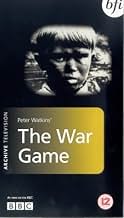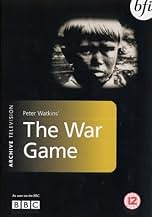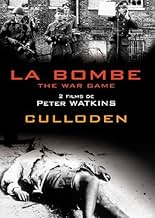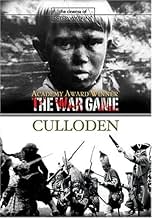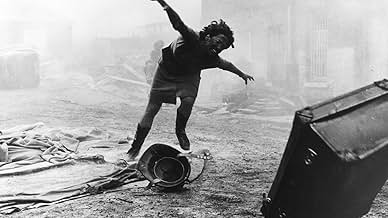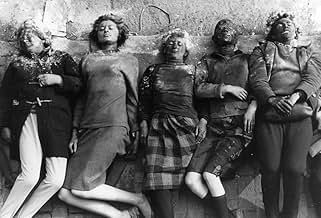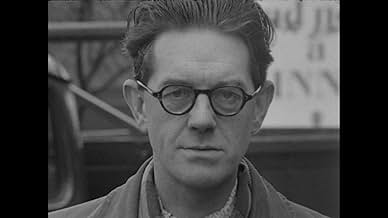AVALIAÇÃO DA IMDb
7,9/10
7,7 mil
SUA AVALIAÇÃO
Adicionar um enredo no seu idiomaA docudrama depicting a hypothetical nuclear attack on Britain.A docudrama depicting a hypothetical nuclear attack on Britain.A docudrama depicting a hypothetical nuclear attack on Britain.
- Ganhou 1 Oscar
- 5 vitórias no total
Michael Aspel
- Self - Commentator
- (narração)
Peter Graham
- Self - Commentator
- (narração)
Dave Baldwin
- Schoolmaster
- (não creditado)
- …
Kathy Staff
- Interviewee
- (não creditado)
Peter Watkins
- Documentist
- (não creditado)
Avaliações em destaque
I saw The War Game thanks to my local branch of CND in 1979 when they showed it in a hall in our town. My mum was vehemently anti-communist so I had to sneak out to see it. The local paper kicked up at 14-year olds being encouraged to see an 'X' film. Was it worth the fuss? Yes, without a doubt. I had already seen Watkin's definitive 'Culloden' earlier that year and was bowled over by the documentary style applied to a drama, but The War Game surpassed even that. I will never forget the scenes of the helmeted English bobbies shooting people in the head to put them out of their misery, or the bucket full of wedding rings or most of all, the line of kids being asked what they wanted to be when they grew up and the replies of 'nuffink.'
For me, that summed up the futility of war, nuclear or otherwise.
'Threads' is good, but 'The War Game' is still the best portrayal of a nuclear attack on Britain ever made. It should be shown more often.
For me, that summed up the futility of war, nuclear or otherwise.
'Threads' is good, but 'The War Game' is still the best portrayal of a nuclear attack on Britain ever made. It should be shown more often.
Just watched this for the first time, having heard and read much about it. It's still powerful stuff, and for 1966 this must have been particularly strong. The British Film Institute have just released this on DVD including an interesting documentary about the BBC's banning of the film, and a copy of Watkins' earlier film 'Diary of an unknown soldier'. Good stuff.
10Baroque
Although this film clocks in at a mere 48 minutes, not a scene, second or frame is put to waste. A level-headed and all too analytical examination of civil preparedness versus the yield of nuclear weapons. What this film presents is the absolute horror of nuclear war in simulated newsreel footage so realistic, you may feel the pain of those on screen. Fire-storms, asphyxiation, flash-burns, over-burdened hospitals leaving victims to die in pain, street executions under martial law, total social collapse, all filmed in a typical English suburb. Originally planned to be a simple documentary on nuclear warfare made for BBC-TV, the film was banned from television (officially because of it's graphic depictions of suffering, but most likely for it's anti-authoritarian stance and defiance of the official line). Later released to theaters, it went on to win major film awards. Two scenes in particular, one of men being executed for violating water rationing and an interview with children at a medical camp, haunted me for days. This is the great-grandfather of such films as "Threads" and "The Day After", but the matter-of-fact narration in BBC English to the devastation on screen adds an element of sheer horror that no other film comes close to. If anyone you know talks about the survivability of nuclear attack, show them this film, and watch their reaction. This film is too important to ignore, and too powerful to dismiss.
The War Game (1965)
The ongoing horrific black and white "footage" of nuclear war preparations and aftermath in Britain is gripping and terrifying. I was a kid in this era, the 1960s, and remember only the official side of it--the government warnings, the bomb shelter information--but I've retained enough of the scariness to really get this inside.
You don't need to be fifty to feel the genuine pain of these people. Yet you have to remind yourself, over and over, that this is all fiction, that it's a movie, that it's just a projection of likely effects. The more amazing aspect is that the movie concentrates on areas on the far fringes of the bomb's explosion (6 to 20 miles away), and leaves the closer damages, the total annihilation, to your imagination.
It's a short movie, and an amazing one. There's nothing like this, for sure, and I think it's should be required viewing for anyone wondering about the current threats of atomic warfare in a dozen different places. It's too real, and it's avoidable, I believe, if everyone does the right thing. Amazing.
The ongoing horrific black and white "footage" of nuclear war preparations and aftermath in Britain is gripping and terrifying. I was a kid in this era, the 1960s, and remember only the official side of it--the government warnings, the bomb shelter information--but I've retained enough of the scariness to really get this inside.
You don't need to be fifty to feel the genuine pain of these people. Yet you have to remind yourself, over and over, that this is all fiction, that it's a movie, that it's just a projection of likely effects. The more amazing aspect is that the movie concentrates on areas on the far fringes of the bomb's explosion (6 to 20 miles away), and leaves the closer damages, the total annihilation, to your imagination.
It's a short movie, and an amazing one. There's nothing like this, for sure, and I think it's should be required viewing for anyone wondering about the current threats of atomic warfare in a dozen different places. It's too real, and it's avoidable, I believe, if everyone does the right thing. Amazing.
The War Game is one of the most amazing films I have ever seen. It's a pseudo-documentary made in 1965, about the possible effects of a nuclear attack on Great Britain. The director's premise is that Britain (and indeed the world) is hopelessly unprepared for such a thing. Some classic scenes: befuddled Brits receiving civil defence booklets. Blank stares greeting the interviewer when he asks Brits on the street about radioactive fallout. The footage is all made to look horribly real. Some of it looks a little hokey - the use of a shaky camera to simulate a desperate ground battle stands out - but there are also very convincing scenes of firestorms raging out of control, sucking the oxygen out of the air for blocks around. Also, incredible scenes of radiation burn victims, food riots, police polishing off the near dead, etc... The killer part is at the end - an interview with some young blast victims will haunt you for a long time.
"Do you know what Strontium-90 is, and what it does to the human body???"
"Do you know what Strontium-90 is, and what it does to the human body???"
Você sabia?
- CuriosidadesDespite being produced by the British Broadcasting Corporation (BBC), the film was banned from television. The official reason was violence and depiction of human suffering, but others hinted that the real reason was because it went against the official government line concerning the survivability of a nuclear attack. The ban didn't forbid cinematic distribution, so the film had a wide theatrical release and won four major film awards.
- Erros de gravaçãoLight can be seen reflecting off a woman's "broken" teeth.
- Citações
Scientist: Technically and intellectually, we are living in an atomic age. Emotionally, we are still living in the Stone Age. The Aztecs on their feast days would sacrifice 20,000 men to their gods in the belief that this would keep the universe on its proper course. We feel superior to them.
- Versões alternativasSome prints replace the stills of Lyndon B. Johnson and Alexey Kosygin with stills of the White House and the Red Square
- ConexõesFeatured in Peter Watkins reflects on the War Game and the media (1983)
- Trilhas sonorasStille Nacht, heilige Nacht (Silent Night, Holy Night)
(uncredited)
Music by Franz Xaver Gruber
Lyrics by Joseph Mohr
Played on phonograph at Dover refugee compound
Principais escolhas
Faça login para avaliar e ver a lista de recomendações personalizadas
Detalhes
- Tempo de duração48 minutos
- Cor
- Mixagem de som
- Proporção
- 1.37 : 1
Contribua para esta página
Sugerir uma alteração ou adicionar conteúdo ausente

